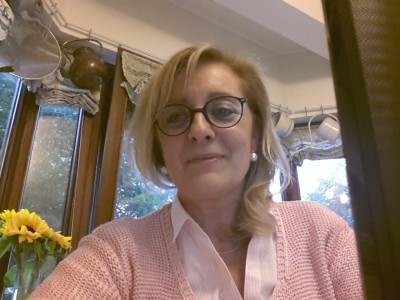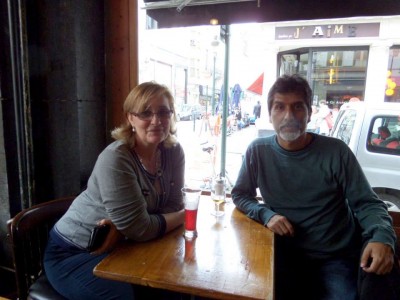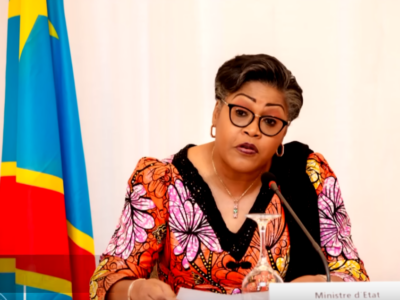
Lourdes in her “bunker.” Photo used with permission.
Global Voices is made possible by a dedicated team of volunteer writers and translators who cover stories happening on the Internet, from blogs, independent press and social media in up to 30 different languages.
Lourdes Sada is one of those talented volunteers. She came to GV in Spanish two years ago to translate, and ended up becoming more involved as an author. Since joining, she has written and translated more than 400 articles and is one of the most active volunteers in the group.
We talked to her about her work for GV as well as other volunteer projects she has taken on.
Global Voices (GV): Tell us about yourself. Where do you live? What do you do?
Lourdes Sada (LS): Soy española, de Aragón. En España he vivido en Valencia y en Euskadi, pero ya hace 22 años que vivo en Bruselas. Trabajo en casa, por eso tengo bastante tiempo para dedicarlo a lo que más me gusta hacer, voluntariado en línea.
Lourdes Sada (LS): I am Spanish, from Aragón. In Spain, I have lived in Valencia and Euskadi, however, I've been in Brussels for 22 years now. I work from home, that is why I have a lot of time to dedicate to do what I enjoy most, volunteering online.
GV: What appeals to you about volunteering online? What experiences have you had?
LS: Empecé a hacer voluntario en línea cuando mis hijos comenzaron a ir a la escuela. Después de varios años ocupada con ellos, me encontré con unas horas libres durante el día que quería dedicar a algo que fuera útil para los demás y al mismo tiempo me enriqueciera. Como antes de instalarme en Bruselas había empezado la carrera de informática, aunque no pude acabarla por el traslado, el mundo de los ordenadores y de Internet no me era ajeno, y el voluntariado en línea me pareció ideal en mi situación, ya que podía aprovechar muy bien el tiempo mientras seguía cuidando de mi familia. Buscando por la red di con una web francesa que buscaba traductores voluntarios y ahí empezó todo.
LS: I began volunteering online when my children started school. After having spent several years with them, I found myself with some free time during the day and I wanted to dedicate it to something that would serve others as well as enrich myself. Before settling in Brussels I had studied computer science, and although I was unable to finish my studies due to relocation, the world of computers and the Internet wasn't foreign to me, so in my situation, volunteering online seemed ideal, as I could now take advantage of my free time, while also continuing to take care of my family. As I searched the web I found a French website looking for volunteer translators, and that is where it all started.
GV: How did you end up with Global Voices and what has made you stay?
LS: Encontré GV buscando en Internet proyectos que necesitaran traductores. Al principio dudaba si ofrecerme como voluntaria, pensé que era un entorno muy profesional, y yo no lo soy. Pero los editores de GV decidieron darme una oportunidad y espero no haberles decepcionado. La traducción para GV es un trabajo que me gusta mucho, porque tengo la oportunidad de traducir sobre temas muy variados. A menudo son noticias de países que no suelen aparecer en la prensa tradicional, otras veces son cosas cotidianas que tampoco llegan a las primeras planas de los periódicos. Todo eso me da una visión más amplia del mundo.
LS: I found GV while searching on the Internet for projects that needed volunteer translators. At first, I wasn't sure about volunteering, I thought the environment might be too professional, and I am not a professional translator. However, the editors at GV gave me an opportunity and I hope I didn't let them down. I really enjoy translating for GV, it gives me the opportunity to translate a wide variety of topics. Often it is on news from countries that don't seem to appear in traditional media and other times it is about everyday things that also don't make on the front page of the news. All this helps me expand my views about the world.
GV: You also write your own articles. Was this a new experience for you?
LS: Sí, nunca había escrito antes para ningún medio. A raíz de un incidente en el parlamento español que me indignó, como a muchas otras personas, me ofrecí para empezar a colaborar también escribiendo artículos en GV. Las cosas en España están bastante mal, pero el problema no es solo económico, también es muy doloroso ver la injusticia, la corrupción, la impunidad. Escribiendo artículos sobre todo esto intento que mi indignación se canalice de forma positiva, difundiendo estos hechos para que más gente tenga la información necesaria para tomar las decisiones más convenientes.
LS: Yes, I had never written before. Because of an incident that occurred in the Spanish Parliament, I became outraged, as well as many other individuals, and as a result of this I offered to start writing articles for GV. Things in Spain are pretty bad, but it's not purely economical, it's also very painful to see the injustice, corruption, impunity. By writing articles about this, I intend to channel my outrage in a positive way, spreading the facts so that more people have the necessary information to make decisions in their best interest.
GV: Have you received feedback on your articles?
LS: Sobre todo de compañeros de GV, de amigos y familiares que los leen. En general, creo que les gusta mi forma de escribir, y sobre todo aprecian el esfuerzo que hago para que los artículos resulten amenos y entretenidos. Cuando escribo intento ponerme en la piel del lector, creo que así el texto tiene más posibilidades de resultar interesante y agradable de leer. Ya que tienen la deferencia de leerme, lo menos que puedo hacer por ellos es no aburrirle
LS: Mostly from GV colleagues, friends and family who read them. Mainly, I think they enjoy my way of writing, but above all, they appreciate the effort I put into the articles so that they are enjoyable and entertaining to read. When I write, I put myself in the shoes of the reader, I feel that way the text becomes more interesting and enjoyable. And since they take the time to read what I write, the least I can do is not bore them.
GV: What has been your biggest challenge as a translator?
LS: Siempre he trabajado como voluntaria, por lo que en general las personas con las que he colaborado han tenido mucha paciencia y me han enseñado muchísimo. Mi primer webmaster me dio un cursillo rápido de html para que pudiera traducir directamente las páginas web, buscando todos los textos entre las etiquetas. Quizá el mayor apuro lo pasé con mi primer encargo, un “tocho” larguísimo que me enviaron con muy poco tiempo, tuve solo cuatro o cinco días para terminarlo y corregirlo. Casi no dormí, pero disfruté muchísimo. El trabajo más grande lo he hecho para Community Empowerment Collective, con los que he colaborado durante muchos años, como traductora, coordinadora y diseñadora web, y aún colaboro cuando me necesitan. No solo traduje más de 400 páginas al español, sino que también diseñé el nuevo formato de la web y convertí más de 4000 páginas en 30 idiomas distintos al nuevo diseño.
LS: I have always volunteered, and in general most of the people I've collaborated with have been very patient and have taught me a great deal. My first webmaster quickly trained me in html so that I would be able to translate directly on the web pages, looking for the text within all the tags. Perhaps my biggest rush job was with my first assignment, they sent me a huge project to translate in very little time, I had four or five days to finish and proof it. I hardly slept, but I enjoyed every minute of it. My biggest project was for Community Empowerment Collective, whom I have collaborated with for many years as a translator, coordinator and web designer, and I still work with them as needed. Not only did I translate over 400 pages into Spanish, I also designed the new format and converted over 4,000 pages into the new format, in 30 different languages.
GV: What is your view on today's freelance translators in the European community?
LS: Tengo entendido que bastante mal. Nunca ha sido bueno, pero con la crisis, la situación va de mal en peor. Por ejemplo, muchos fabricantes recurren a traductores electrónicos para traducir las instrucciones de sus productos a otros idiomas, aunque resulte un batiburrillo ininteligible. Así, poco a poco se va reduciendo el campo en el que se mueven los freelancers. La mayoría de los traductores que conozco trabajan en las instituciones europeas, quizá sea más aburrido, pero elimina riesgos.
LS: I can tell it's considerably poor. It's never been good, and with the crisis, the situation is even worse. For example, many manufacturers resort to electronic translators to translate their product instructions into other languages, even if it turns out to be an unintelligible chaos. In that way, little by little, the field of freelance translators has been diminishing. The majority of translators I know work for European institutions, perhaps it is more tedious, but it eliminates any risk.

Lourdes with the author Juan Arellano in Brussels. Photo used with permission.
GV: What would you say to those starting out in the translation world?
LS: Algo muy simple: que lean sus traducciones. En mi humilde opinión, hay una regla básica para que una traducción cumpla con su cometido: que no se note que es una traducción. Por otro lado, que tengan paciencia, que por mal que estén las cosas tarde o temprano tendrán que ir a mejor. Además, como han hecho otros profesionales, los traductores deberían plantearse luchar contra el intrusismo y empezar a exigir que se proteja su campo profesional de personas no cualificadas y sobre todo, de máquinas. Si lo logran, todos saldremos ganando.
LS: It's very simple: read your own translations. In my humble opinion, there is one basic rule for the success of a translation: the reader must not notice it's a a translation. On the other hand, be patient, no matter how bad things are, sooner or later they will get better. Furthermore, as other professionals have done in the past, translators should put up a fight against professional infiltration and start demanding that their field be protected from individuals who are not quailified and above all, machines. If successful, it's a win-win situation.
GV: If it were up to you, what would you change or intensify within Global Voices?
LS: La verdad es que me gusta tal cual está, y aún más con el nuevo diseño. Yo creo que en este caso lo mejor es aplicar la primera ley de la mecánica: si funciona, no lo toques.
LS: Truthfully, I enjoy it just the way it is, especially now with its new design. I think in this case it is best to apply the basic law: if it ain't broke, don't fix it.
GV: Tell us something about yourself that makes you unique, or an aspect that you feel is special.
LS: Si hay algo que creo que se me da muy bien es moverme por la Red, encontrar cosas en Internet, ya sea información, aplicaciones, programas, objetos en venta… no sé si será por paciencia, por intuición o por simple terquedad, pero rara vez no acabo encontrando lo que necesito. Tanto así, que mis amigos me llaman en broma “yopreguntoaLourdes.com”.
En otro orden de cosas, hace unos años, Phil Bartle, autor del CEC, y John Petroff, administrador del PEOI, con quien también colaboré varios años, me nominaron para el premio “Voluntarios del Año” que concede el servicio de voluntarios en línea de Naciones Unidas. Este premio me dio una gran alegría, no solo porque dejó claro cuánto apreciaban ambos mi trabajo, sino por constatar qué buenos amigos he ido haciendo por el camino.
LS: If there is one thing that I do well is navigate the web, finding things on the Internet, whether it be information, apps, programs, things for sale… I am not sure if it's due to my patience, intuition or purely stubbornness, but it is rare that I don't find what I am looking for. So much that my friends jokingly call me “IAskLourdes.com.”
On another level, a few years ago, Phil Bartle, author of CEC, and John Petroff, PEOI administrator, whom I also collaborated with for several years, nominated me for the UN “Volunteer of the Year” award, granted to online volunteers. This award gave me great joy, not only was it clear that they both appreciated my work, but it also confirmed that I have developed wonderful friendships throughout this journey.
Thank you, Lourdes! You can read her translations and articles here, and follow her posts on Twitter @LulesSada.







2 comments